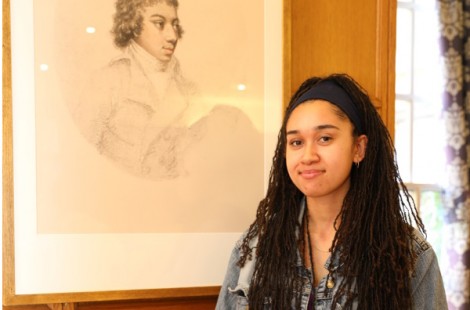
Antonia Antrobus-Higgins, a second year student at Murray Edwards, has won a major Cambridge University prize for an essay on how far Cambridge challenges the myth of Black inferiority.
Antonia, who studies Human, Social and Political Sciences, was the overall winner of the prestigious George Bridgetower essay competition, which is open to all current undergraduate and postgraduate students at Cambridge. The essay theme is set each year on a topic relating closely to race and Black student experiences at the university, and the first prize is £1,000.
The annual prize, founded in 2022, was named after George Bridgetower, a Polish-born virtuoso violinist and composer of African descent, who studied at Trinity Hall and was awarded a music degree in 1811.
The competition is hosted in partnership with Cambridge University’s Legacies of Enslavement Inquiry and the Alexander Crummell Fund, which provides support for anti-racism work within the university. Crummell, an abolitionist and pan-Africanist, studied at Queens’ College, and is the first recorded Black graduate of Cambridge.
We caught up with Antonia with some questions about herself and her prizewinning essay.
• What are the key themes and conclusion of your essay?
The question was, 'To what extent does Cambridge, as an academic institution, challenge the myth of Black inferiority? I argue that Cambridge helped to create the myth of Black inferiority and continues to perpetuate this myth in the present. I talk about access and outreach, Black excellence countering imposter syndrome but encouraging assimilation, the problems of the curriculum, the Black awarding gap, arms funding, and the university's commitment to change.
• What inspired you to enter the competition?
I saw the competition last year and but didn't even know where to begin with an answer so told myself I'd try again next year. Then the question came around and I found it really interesting and relevant to some of the experiences I've had and I'm frustrated by. The essay gave me a platform to voice this frustration and now the written record of it will be disseminated throughout the university, and I think there's a lot of power in that. I hope the essay will encourage the actual implementation of student-researched recommendations to close the Black awarding gap.
• Tell us a bit about yourself and your life before Cambridge
I'm from south London and was raised by my mum, uncle and nan, who was part of the Windrush generation. I went to Chestnut Grove Academy, which has only recently started to send students to Oxbridge. My favourite subject probably was English Literature because I could analyse social issues through the texts. And it was actually the process of writing my English coursework that made me realise that I wanted to study sociology!
• What did your Cambridge application focus on?
In my personal statement I wrote about the importance of understanding the violence of colonialism to understand how it has impacted our present. In the interview I really thought that the Cambridge academics would strongly disagree with me if I said my honest thoughts about colonialism.
• How did you come to choose Murray Edwards?
I applied directly to Murray Edwards. I asked my mentor (who went to Trinity Hall) what college she would have applied to hindsight, and she said Medwards [the informal Cambridge name for Murray Edwards]! After that, I actually looked into it a bit more and I really liked how the website said that the college was for those that 'who strive to achieve their full potential and make a difference in the world'.
• How important is the prize and the wider work the university is doing on slavery in prompting people to think differently and bring about change?
I think it's a good sign that the university cares what students think. The essay (although it's such a Cambridge way to do so) is a platform in which students can vocalise their thoughts about what the university is doing in regard to the experience of Black students. I think the value of the competition can only be revealed by what comes of it.